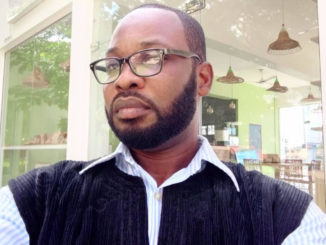Greeting the Toys
Its 7:21 a.m. in Ghana’s capital city. The Rainmaker casts His water-laden clouds over a large expanse of Accra’s sky. The morning Sun’s golden orb is veiled – its sparkling rays held in abeyance. Subdued drumrolls of thunder can be heard in fits and starts – foretelling an obvious event. Birds abandon their morning duties and scurry back to the warmth of their nests. As far as ordinary eyes can stretch, heavily pregnant clouds prevail – the birth of countless quadrillions of fat raindrops is imminent. But the strong, dust-bearing winds have yet to blow.

Inside the Adenta SSNIT flats, Kojo’s 7-year-old daughter can be faintly heard in the narrow porcelain-floored corridor. It’s not her footfalls making audible sounds – it’s her soft, endearing voice. She’s greeting. She’s not greeting her parents or siblings – she did that already – having first paid homage and given thanks to the Giver of Life who had counted her among living souls on a cool Saturday morning in mid-June. Ekua is extending hearty morning cheers to some other ‘people’. Her father wonders who.
Ekua’s father, Kojo is up – he woke two and a half hours earlier. The cord linking him to the sleep world has grown thin and sensitive – so sensitive the soft landing of a butterfly breaks it. Kojo is a privileged middle-class worker who takes home a decent pay cheque. He is a Clinical Psychologist for a private healthcare provider. Yet, the cares of life weight heavily on his heart and mind – as a greedy merchant’s cargo burdens the back of his camel. Tomorrow’s unborn fears dress-rehearse on the stage of his imagination, and he is an unwilling but helpless spectator.
The morning is quiet – there is a glut of silence in the room. But inside Kojo’s head, silence is in short supply. The paradox of the physician who cannot heal himself. The psychologist is unable to live what he preaches – the science of silencing the mind.
Kojo does not relish playing audience to the melodrama unfolding in the amphitheatre of his mind. He seeks an escape route. To his bedside radio he turns. It is within arm’s reach. He presses the power button, and with the concluding words of a journalistically-manicured sentence, a familiar feminine voice breaches the silence in the room.
…June rains… choked gutters…floods in Accra… people dead… innocent children included… corona virus… Jean Mensah… the sorry state of the healthcare system…Kennedy Agyapong…fake pastors…roads with teenage potholes growing into adult manholes…The radio woman throws full grown sharks into the fish pond Kojo is desperately trying to swim out of. Further disquieted, he stretches out his arm again and hits the scan button on the radio.
…Ketu South…Ekuapim Poloo…John Mahama…Auditor-General… a brief spot of silence… then finally, the soothing sound of dexterous fingers melodiously caressing the sprightly keys upon a 19th Century grand piano. It’s Beethoven’s Moonlight Sonata on Atlantis Radio. The feeling is like a water-starved desert wanderer who finds an oasis in the sweltering heat of the Kalahari. Kojo heaves a sigh of relief as he reverently lifts his fore finger from the radio’s scan button.
Meanwhile, Ekua is still extending hearty morning greetings to some ‘people’. Kojo is puzzled. He was last to retire to bed and first to rise – or rather first to be awakened by his fears and longings.
No visitors were expected – none had come in the night before. Who then could his daughter be greeting with such cheer? The sound of the radio drowns his daughter’s voice – he barely hears her. Curious, he gets off his bed, tiptoes and kisses the bedroom door with his right ear. He hears nice-sounding exotic names as they spring forth merrily from his daughter’s lips… Daisy, Franklin, Tiger, Mickey, Nancy, Joey ….
Ekua is cheerily exchanging pleasantries with all the toys with limbs… and there is no telling the difference between the joy with which she greeted her father and that with which she does Daisy et al. She sees more than just utility objects. The little beauty considers them fellow housemates and friends. And it’s not because she lacks human friends and playmates – she’s blessed to have three other siblings. In the past, Kojo had heard birthday songs sung by his children when he was sure all the birthday boxes had been ticked off the calendar. In whose honour were the songs sung? The toys! Having satisfied his curiosity, Kojo returns to his bed – cognitively dismissing his daughter’s action as ordinary infantile play.
READ ALSO: Losing Treasures – By Laud Freeman
Like Kojo, father of four, many parents are quick to throw precious things out the window. How often have we not judged children as just being childish? How often do we not assume that we are right by virtue of our being older? What if we are holding the wrong end of the stick sometimes? What if we are wrong in the interpretations we put on some of children’s actions? Do we sometimes consider that we can and should learn from children? Do we ponder that children teach us to teach them? How often have we not read, that out of the mouths of babes and sucklings, God has ordained strength? Surely, the writer spoke not of strength of bone and muscle – it’s not the forte of the young. To be grown in earth years, is not to be grown in the subtleties of Truth.
The pure soul in a child knows that everything has a ‘mind’ of its own. It knows that in truth, there is no such thing as an inanimate object – God’s living Spirit creates and animates all things. The truth in children shines through their deeds. It up to us to distill the pure essence from their seemingly juvenile actions. We could use that inborn knowingness to teach them to respect and value all things great and small. We could teach them that everything responds to Love – that Love reciprocates itself – that they should show Love and gentleness and respect and gratitude not only to people, but that they can and should extend like virtues to the Sun, the trees, the rivers, the birds, the rocks, the grass beneath their playful feet. We can affirm in them the truth that when they treat a book with respect, the book will gladly pour out knowledge into their inquiring minds.
So dear parent, guardian, adult. It is time to stop looking and start seeing. We are students of our children in as much as we are their teachers. There, in the seemingly infantile deeds of children, lies the clue to creating a better tomorrow – to halting the future continuance of the destruction of our forests and water bodies. They may be fragile in strength, young in age and small in stature, but in them lies a great ageless tool we can use to dig up the taproots of selfishness, greed, insensitivity and the many other ills that ail humanity. And what better time to do so than when the ground is still soft?
–
Laud E. Nyampong Freeman
The writer is a Communications, PR and Marketing Consultant with close to two decades of professional experience across several industries. He may be contacted on Tel: (GH) 0268811122 and Email: laudfreeman@gmail.com



